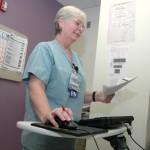The election frenzy is over. Everybody is sipping coffee and exchanging “I told you so” looks across the water cooler. But not everyone is as relaxed. Healthcare practitioners in particular will have to ensure their ehrs are interoperable and meet compliance standards.
Not just Digitizing Paper Records.
Adopting an Electronic Health Record is not just about computerizing existing workflow patterns. The core purpose of an ehr is to get rid of fragmented, incorrect and incomplete medical information and facilitate seamless exchange of healthcare data.
Failure to select an ehr that is highly interoperable means not just facing compliance issues, but losing millions of dollars.
Case in Point…
An Illinois hospital was in the news recently for losing millions of dollars due to interoperability issues. According to IOM the hospital lost a staggering 700,000 dollars every year. It includes the money spent on hiring five pharmacists to manually verify prescriptions. So, doctors who couldn’t access the ehr didn’t end up prescribing the wrong drugs and dosages.
The Road Blocks !
In a perfect world doctors would be able view and share data seamlessly. Patients needn’t be worried about their employers getting info about their medical problems. And nobody needs to lose sleep over data security. But the healthcare landscape is far from perfect.
Heavily proprietary, ehr systems, which fiercely, prevent competitors to gain access. Medical terminology, and abbreviations, that differ across specialties. And confusion about where to start, are the major hindrances towards achieving seamless interoperability.
Knowing What Matters !
But before deciding on where to look it is important that physicians have a clear idea of what to look for. There are four key components that experts believe, play a vital role in determining whether you meet interoperability standards.
- How applications interact and communicate with users.
- The way different systems communicate with one another.
- The manner in which healthcare information is used and managed.
- And the ability to work across different devices and platforms, like smartphones and tablets.
Getting it Right Without Learning the Hard way…
Physicians and practice managers need to keep a cool head. Being pressurized by promises, brochures and tight deadlines is not the way to go. The ehr is an expensive investment, which when done right can save a practice millions of revenue.

